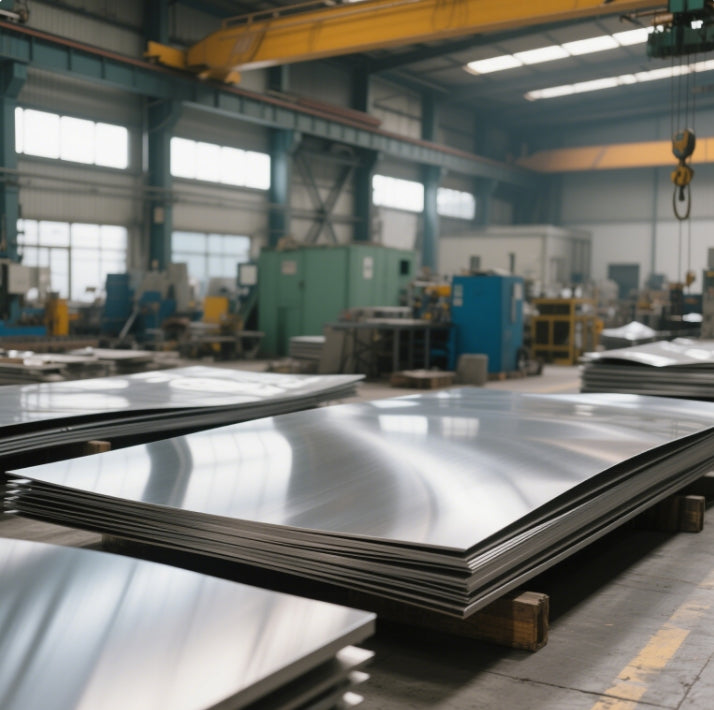StockSteel
Certified Stainless Steel Metal Plate | 316L for Food Processing
Certified Stainless Steel Metal Plate | 316L for Food Processing
Couldn't load pickup availability
Certified Stainless Steel Metal Plate | 316L for Food Processing
Product Overview
Our 316L stainless steel plates are premium-grade austenitic stainless steel designed for demanding food processing applications. With exceptional corrosion resistance, hygiene compliance, and mechanical durability, they meet stringent global standards (ASTM A240, ISO 3506) and are ideal for equipment like mixers, conveyors, storage tanks, and anti-slip stainless steel plate surfaces. Available in customizable dimensions, surface finishes, and processing services.
Technical Specifications
1. Chemical Composition
| Element | Content (%) |
|---|---|
| Carbon (C) | ≤0.03 |
| Chromium (Cr) | 16.0–18.0 |
| Nickel (Ni) | 10.0–14.0 |
| Molybdenum (Mo) | 2.00–3.00 |
| Manganese (Mn) | ≤2.00 |
| Silicon (Si) | ≤1.00 |
| Phosphorus (P) | ≤0.045 |
| Sulfur (S) | ≤0.030 |
Complies with ASTM stainless steel plate standards (A240/480M) and GB 4806.9-2023 for food safety.
2. Mechanical Properties
| Property | Value |
|---|---|
| Tensile Strength | 485–620 MPa |
| Yield Strength (0.2% Offset) | 170–310 MPa |
| Elongation (%) | ≥35–60 |
| Hardness (Brinell) | ≤217 HB |
| Density | 7.98–8.03 g/cm³ |
3. Physical Properties
| Property | Value |
|---|---|
| Melting Point | 1375–1450°C |
| Thermal Conductivity | 16.2 W/m·K |
| Electrical Resistivity | 0.74 Ω·mm²/m |
| Coefficient of Thermal Expansion | 16 × 10⁻⁶/K (20–100°C) |
4. Available Dimensions & Surface Finishes
| Thickness (mm) | Width (mm) | Length (mm) | Surface Finish |
|---|---|---|---|
| 0.1–120 | 100–2200 | 1000–6000 | 2B, BA, No.4, HL, Mirror, Anti-Slip |
Custom sizes, edge treatments (mill/slit edge), and embossed patterns available.
Key Features & Applications
1. Superior Corrosion Resistance
316L resists pitting, crevice corrosion, and chloride-induced stress corrosion cracking, making it ideal for saltwater exposure, acidic food processing, and chemical cleaning environments. Its low carbon content minimizes carbide precipitation during welding, ensuring are stainless steel plates safe for hygienic applications.
2. Hygienic & Non-Toxic
The smooth, non-porous surface inhibits bacterial growth and chemical reactions, complying with FDA and EU 10/2011 standards for food contact.
3. High-Temperature Stability
Maintains structural integrity up to 870°C (intermittent) and 925°C (continuous), suitable for sterilization, pasteurization, and heat exchangers.
4. Customizable Solutions
Choose from cold-rolled precision or hot-rolled durability, with optional anti-slip stainless steel plate textures for walkways, stairs, and wet processing areas.
Performance Details
1. Tensile & Bend Strength
- Tensile Strength: 485–620 MPa ensures resistance to deformation under heavy loads, critical for industrial mixers and pressurization systems.
- Bend Strength: Excellent ductility allows cold forming and bending without cracking, ideal for custom tank designs and conveyor chutes.
2. Weight Calculation
Calculate plate weight using:
Weight (kg) = Thickness (mm) × Width (m) × Length (m) × Density (7.98–8.03)
Example: A 5mm × 1m × 2m plate weighs 79.8–80.3 kg.
3. Marking & Identification
Plates are laser-etched with grade (316L/UNS S31603), thickness, heat number, and certification (EN 10204 3.1 or ASTM A480).
4. Why Stainless Steel Rusts?
While 316L is highly corrosion-resistant, rust can occur due to:
- Chloride Exposure: Prolonged contact with brine, seawater, or cleaning agents damages the chromium oxide layer.
- Mechanical Damage: Scratches or abrasions from tools expose the iron substrate to oxidation.
- Low Oxygen Environments: Stagnant water in crevices inhibits oxide layer regeneration.
- Chemical Contamination: Strong acids/alkalis (e.g., bleach) accelerate localized corrosion.
Why Choose Our 316L Stainless Steel Plates?
- Certified Safety: Complies with ASTM stainless steel plate standards (A240/A480M) and GB 4806.9-2023 for food contact.
- Hygienic Design: Non-reactive surface ensures are stainless steel plates safe for FDA/EU-compliant food processing.
- Anti-Slip Solutions: Custom anti-slip stainless steel plate textures enhance safety in wet environments.
- Global Traceability: Full Mill Test Certificates (MTC) and ISO 9001/14001 certifications.
- Fast Delivery: 10–30 days for standard orders, with slitting, punching, and bending services.

